AI and Localization: Sprinting with the Red Queen to stay in the relevance race
My aunt Angelines played a crucial role in my love for reading. She had a bookstore in Aluche, a neighborhood in Madrid. I remember being fascinated when I visited her, surrounded by the numerous books and stationery items. The smell of books is hard to explain, but I loved being there.
She used to gift me books, and I recall one with beautiful illustrations of Alice in Wonderland charming drawings. That book was quite intriguing, a metaphor for life's aspects that I didn't fully grasp, but I enjoyed the illustrations . The White Rabbit was always in a hurry, shouting, 'I'm late, I'm late! For a very important date!' Then there was the Red Queen, who also made references to going super fast when she told Alice, 'In the Red Queen’s Race, it takes all the running you can do just to keep in the same place! If you want to get somewhere else, you must run twice as fast!'
I often thought about the hurry in that book, and I feel the same way this year. and I don't think I'm alone. The episode with Sam Altman, founder of OpenAI, exploded just a week ago. The board fired him from his own company (similar to what happened to Steve Jobs at Apple). Over the weekend, dozens of hypotheses and urban legends circulated about the reasons for his dismissal. Hours later, hundreds of employees threatened to leave OpenAI, and in a curious turn of events, Satya Nadella, CEO of Microsoft, offered him to join Microsoft and lead the AI division. The next day, he was asked to return to OpenAI. It's incredible what happened in those 3-4 days, and I couldn't help but think of the Red Queen from Alice in Wonderland, saying that in her kingdom, you had to run twice as fast to stay in the same place.
Over time, I learned that the Red Queen is a metaphor, an evolutionary principle that states a species must adapt and evolve for reproductive advantage and survival because competing organisms are evolving. In a way, I feel this is happening with OpenAI, LLMs, and the AI explosion we've experienced in just a few months.
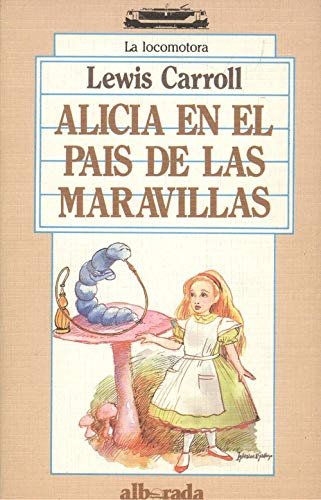


It's amazing how much ChatGPT has been talked about this year, and rightfully so—it's a powerful and useful tool. However, as humans, we don't always use the things we invent for good. With AI, there are many ethical layers that haven't been resolved yet, and hopefully, we can address them.
But the goal of this post is not to talk about whether AI is helpful or not, but what seems inevitable—that as professionals in the localization industry, it seems we'll have to run twice as fast to end up in the same place. LLMs, in general, or ChatGPT, in particular, don't bring something entirely new; we've been doing machine translation for years. Many companies customize MT by adding glossaries and style guides. The novelty of ChatGPT is that it's applicable to many areas and does many things reasonably well, even excellently. Yes, it's clear that it makes things up, but considering the progress ChatGPT has made in a year, it's hard to imagine what it can do in the not-too-distant future, say, three years.
Click HERE to download the presentation
So, this week's post is about what we can do to perhaps end up in the same place, but it doesn't seem like we have another option.
1.- Change the Mindset: In various localization events I attended throughout the year, informal ones like LocLunch or LocDrinks, or formal ones like LocWorld, I've talked to many people who have heard about ChatGPT but haven't explored it much. There isn't a single reason why they haven't tried it, ranging from concerns about how well ChatGPT understands and adapts to different languages and cultural contexts during localization to worries about maintaining a consistent tone and style throughout localized content. There are also concerns about the confidentiality and security of data, or more human concerns, such as a potentially steep learning curve or The Elephant in the room, and the fear of job displacement. AI is here to stay, and like we overcame the fear of translation memories and machine translation, we have to do the same with this new technology. We need to reframe our thoughts towards AI to explore how to get better by using it. Here are some ideas to reframe our mindset:
· Opportunity in Change: Instead of perceiving ChatGPT as a hurdle, we might choose to see it as a chance to innovate.
· AI as a Strategic Ally: Rather than fearing AI as a threat, we can consider it a valuable ally. AI can handle repetitive tasks with precision, allowing human localizers to focus on more complex and creative aspects of localization. Think of AI as a colleague, freeing you up to bring a unique and human touch to the localization process.
· Adaptive Resilience: Embracing change builds resilience. Like the Red Queen adapting her strategies, a mindset geared toward embracing change makes localization professionals more adaptable and resilient in the face of new challenges.
· Learning from AI: Instead of viewing AI as a competitor, there’s an alternative. We can approach it as a teacher. AI can provide insights and data that enhance decision-making. By learning from AI, localization professionals can stay informed about trends and make more informed choices in the localization journey.
· Collaboration with Technology: Rather than working against technology, collaborate with it. See AI as a complementary force, amplifying your capabilities. It's not about humans versus machines; it's about humans working alongside machines to achieve greater efficiency and effectiveness.
2.- Sharpen the Axe: By now, I hope to have given you food for thought, and if you're ready to change your mindset, let's move on to the next level, which is sharpening the axe. Stephen Covey already emphasized this in his classic '7 Habits of Highly Productive People.' Sharpening the tools is all about investing in training. The Red Queen's race demands sharp skills, and investing in continuous training is the way to stay ahead. Reading about ChatGPT tutorials and taking courses is a must, and many are free and available on this platform. My favorite, in fact, to start overcoming the fear of ChatGPT is a course we can find on this platform, on LinkedIn. Dave Birss, with his course 'How to Research and Write Using Generative AI Tools,' gives us a genuine master class on how we can use it to maximize our capacity in research and writing.
3.- Start Small with ChatGPT: Starting small with ChatGPT allows us to gradually explore and integrate its capabilities into our localization workflow while mitigating concerns and gaining confidence in its applications. For example, we can experiment with ChatGPT in crafting basic multilingual social media posts. While it might not capture the full cultural aspect, it can provide a starting point for creating posts that resonate with a diverse audience.
4.- Embrace Community Collaboration: Community collaboration is a valuable aspect of navigating the integration of AI tools, including ChatGPT, into the field of localization. Engaging with the localization community provides numerous benefits and insights that can significantly enhance your understanding and approach. We can do this, for example, by simply sharing experiences. By actively participating in community discussions, we gain access to shared experiences of professionals who have already integrated AI tools into their localization workflows. We can also discuss best practices. Engaging with the community allows us to learn about best practices in integrating AI into localization strategies. Or simply, feedback and tips will bring benefits. Actively participating in community forums allows us to seek feedback on our approach and receive tips from professionals who have already navigated similar paths.
Conclusion
Who knows how this AI thing will turn out; time will tell. I feel we are on the verge of a profound change, reminiscent of what happened when the internet became widely used two or three decades ago. Whatever happens (and I hope ethical control of AI is one of the things that happen), I think it's fundamental to take a step forward, or two, or... start running fast, to perhaps end up in the same place we were not long ago. But in the end, it's about finding a way to remain relevant, and to do that, rethinking our relationship with AI and learning to use it to our advantage seems non-negotiable.
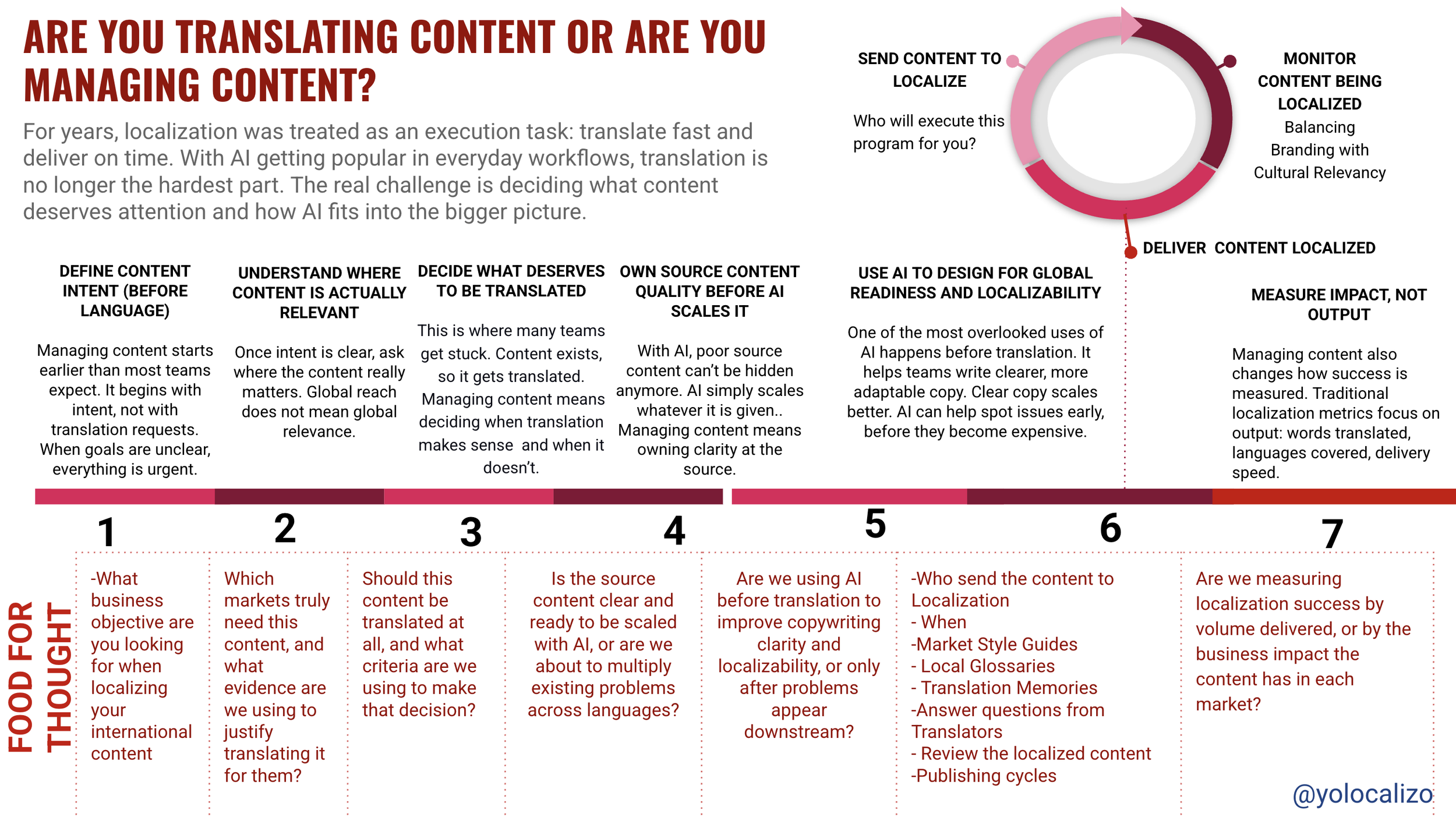

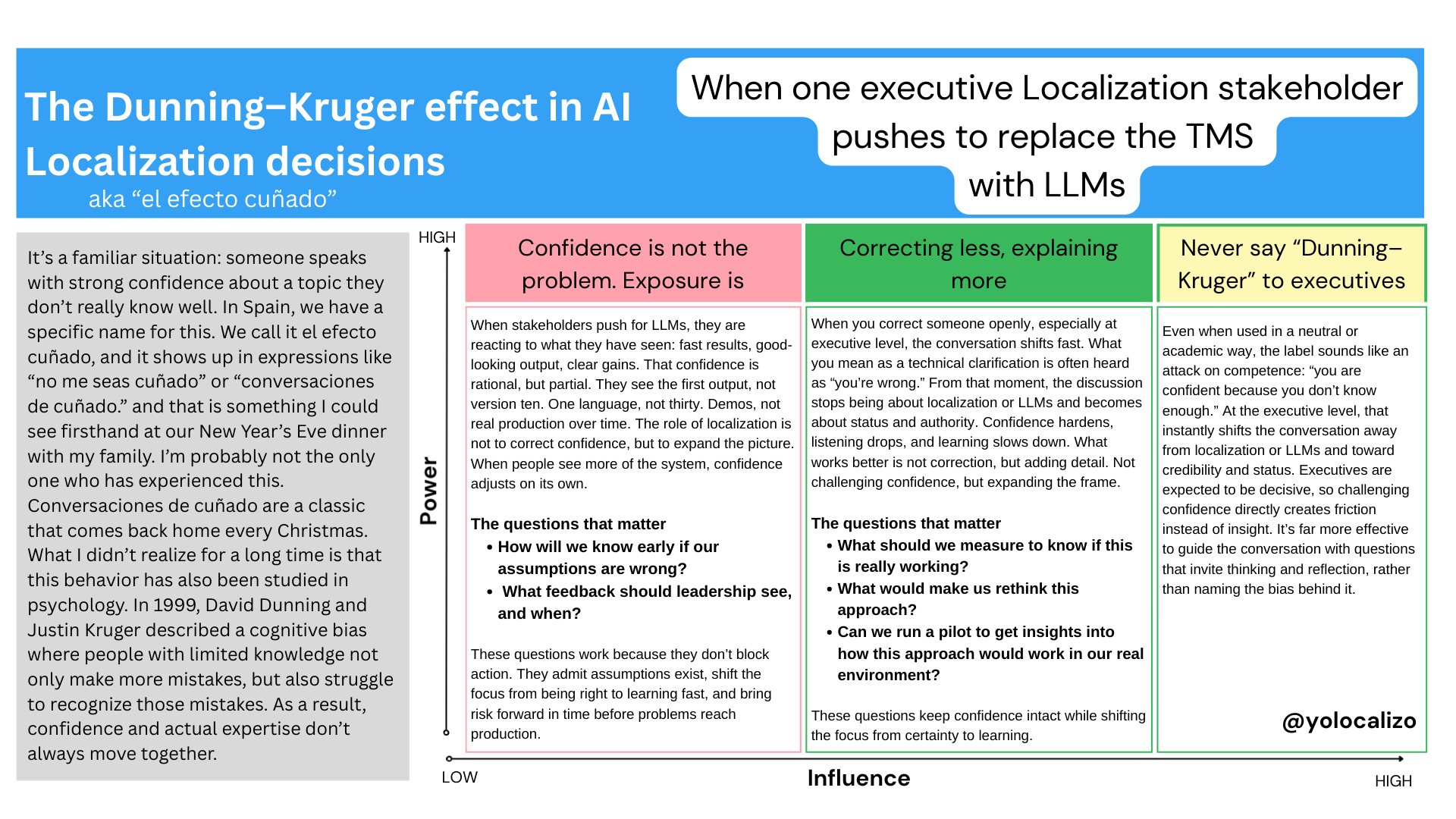


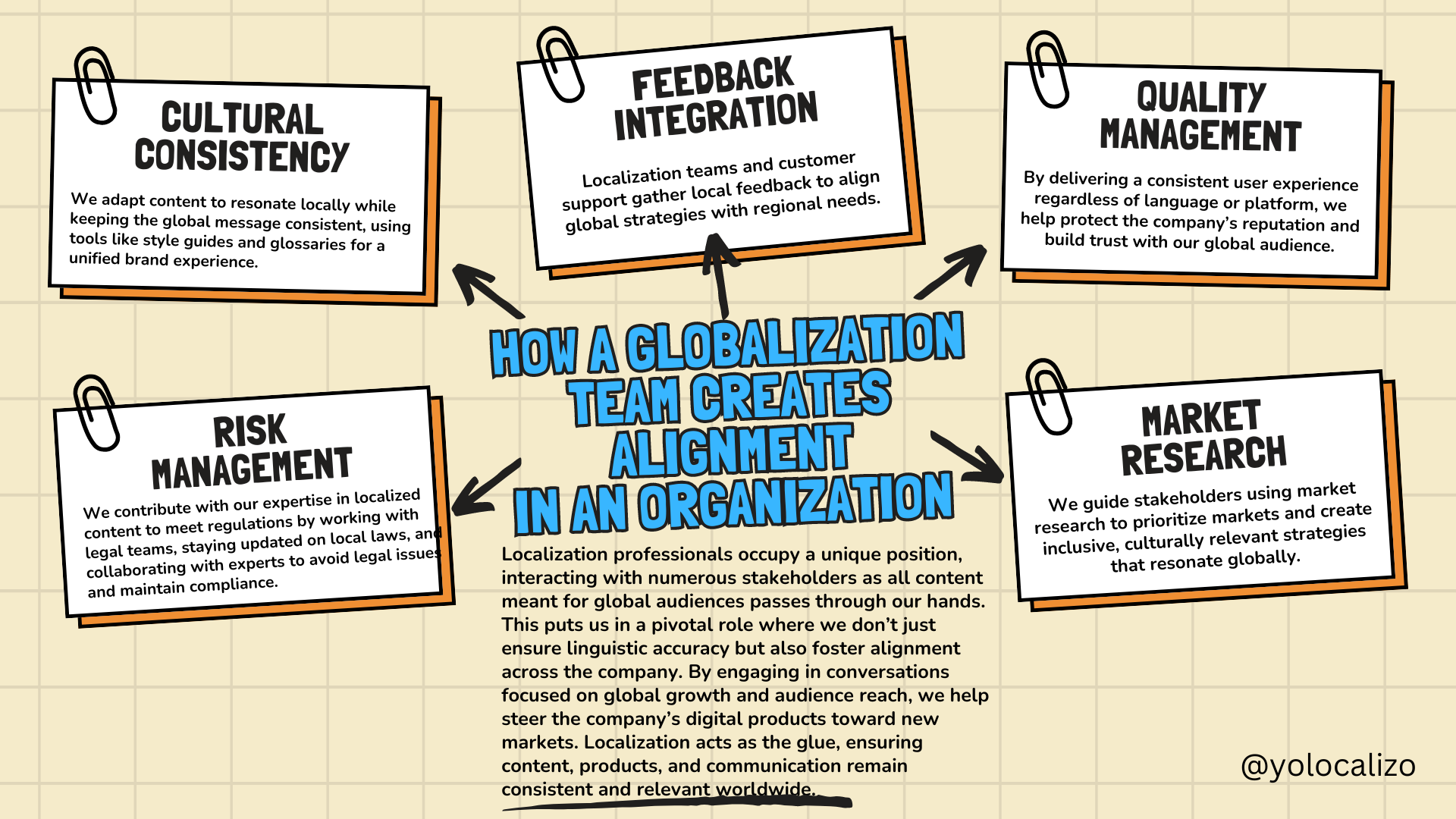
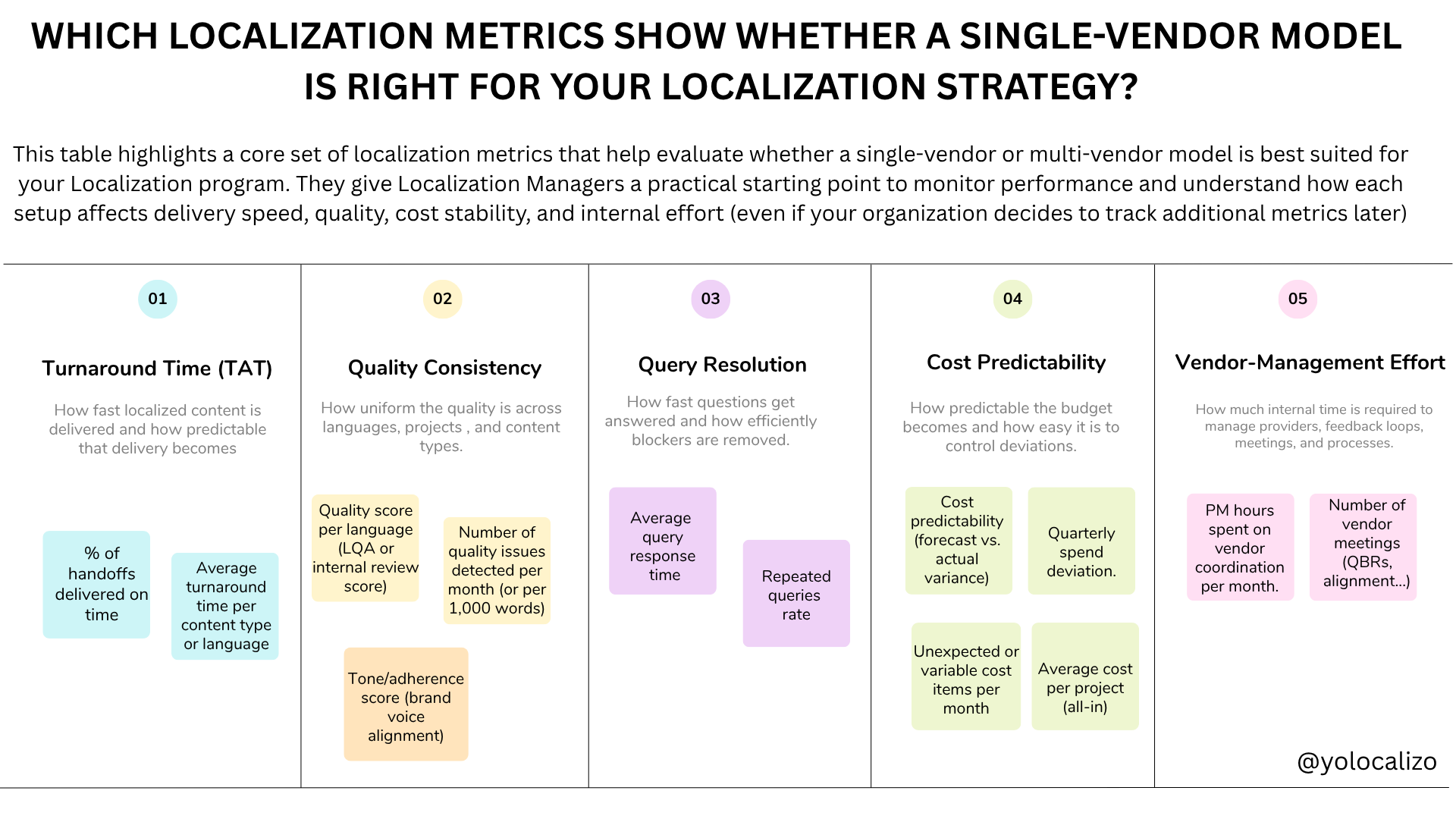






Outside the circles of localization and globalization, translation is still seen as the step to go global. As if adapting the language automatically creates a global product. As if users in new markets will suddenly feel at home just because the words are no longer in English. In reality, that’s rarely how it works. Users don’t experience products in pieces. They experience prices, payments, support, content, and expectations all at once. Adapting the language is an important start. Still, users experience the product as a whole. If only the words change, they will naturally notice the parts that didn’t.